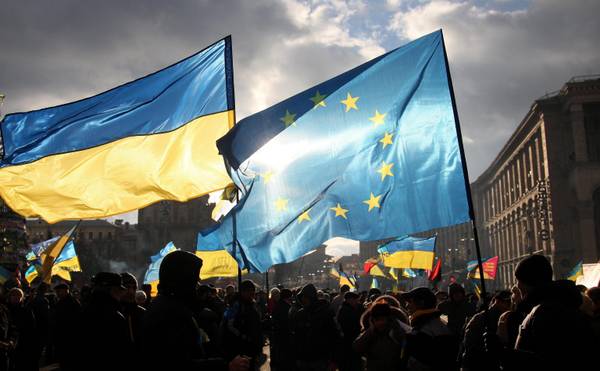The endless contrast between the two souls of Ukraine
Divided by history, economy and culture
14 April, 19:58by Pierluigi Franco
(ANSA) - KIEV - The destiny of Ukraine seems to be already written in its name ''land at the edge, border land''. It has all the features of the territory that borders the Eastern and Western European culture. Here is where, shortly before the eleventh century, the Scandinavian Rus' created the first kingdom, known as Kievan Rus', which would has given rise, to the East, to the immense Russia of Muscovy. But it is also here where, westward, ancestral aversion to Russian domination developed. First against the Tsar, then against the Soviet Union, today against the revived Russia of Putin. It is an aversion rooted in ethnic, political, religious and economic reasons. Towards the East the mining and the most industrialized area that always looked to Moscow lies. Here Russian is spoken and the Orthodox Church is part of the Patriarchate of Moscow. To the West, however, Ukrainian is spoken, the religion, even orthodox, refers to the Church of Rome in the Uniate spirit, people look at Western Europe, at neighbouring Poland of which they fell to be part, at the memory of Vienna with his enlightened empire. It is therefore that today the European Union must pay attention to this controversy never been resolved, to these two souls.
To understand how to deal with the Ukrainian politics, perhaps, the EU should keep in mind that the ancient history of this strategically important nation, with over 46 million inhabitants, emerges continuously. Moreover the link to the roots and the history seems to be a characteristic of the Slavic world, just think of what has happened and still does in the Balkans. But the Ukrainian dualism has also deals with an economic reality increasingly important: the link with the energy supply. It is known that the Russian gas transits through Ukraine, and that gas, of which Moscow controls the taps, was more than once a matter of concern for the whole Europe, as well as for the Ukraine. Because of the gas, there is also the rise of Julia Timoshenko, pretty and ambitious leader of the 2004 'Orange Revolution'. She started out from the Soviet Komsomol and landed at the top of Ukrainian politics after having had economic fortune in the 90s as President of the 'General Energy Company' and having played a leading role in managing the affairs related to Russian gas. Just from the Russian gas, however, her recent troubles came also. She is been arrested with a sentence of seven years tied to a supply contract. However, there are many who think that behind her troubles, contested by the EU and the whole Western block, purposely could be the potentates of Russian energy.
The violent clashes in the Kiev main square, where the face of Iulia stands on posters and flags together with the European flag, shows once again the two souls. Once forgotten the period of Viktor Yushchenko, the pro-European allied with Iulia in the 'Orange Revolution' and defeated by the heavy Russian energy blackmail, Ukraine has passed prior to the hands of the blonde leader, at the time also accused of playing a double game with the Russian friend-enemy, and then to the historic rival Viktor Yanukovich, whose electorate looks at Moscow. The Ukrainian president, anyway, does not seem to do well in the difficult balancing that the Ukrainian situation would impose. After having diplomatically stated more times the positive will of Kyiv towards the EU, which is considered ''an political, economic and social successful example'' and expressing ''a desire to become, one day, a full member,'' Yanukovich had to say 'no' to the EU-Ukraine Association Agreement, which seemed a done deal. Difficult, if not even impossible, to choose between the EU and Russia. The two Ukrainian souls back, but this time also the moneys weigh: to adopt European standards, according to Yanukovich, 160 billion dollars until 2017 are needed, considered an excessive amount.
On the other side there is always gas. At present Ukraine pays Russia over 400 dollars per thousand cubic meters of natural gas, while the goal is to obtain a ''fair'' reduction below 300 dollars. The signal of a possible reduction is coming from Putin. The leader of Kremlin, notoriously reluctant to lose pieces of what once was the Soviet empire in favour of the EU, has announced that the price of Russian gas to Armenia will be of 189 dollars per thousand cubic meters. An explicit way to make clear to Kiev the benefits of a joining to the Custom Union with Russia, Belarus and Kazakhstan, already signed by the Armenian president.
In this difficult scenario, Ukraine offers a talk together with Brussels and Moscow. Perhaps it will help to clarify the respective roles, but it will hardly be able to bring together two Ukrainian souls. It does not seem easy for the EU to comprehend that part on the industrialized Ukraine, which still thanks Stalin, which was Land of Kruschev and Breznev. The same Ukraine in which the Russian Crimea is an independent Republic, the Ukraine of Sebastopol, unique city in the world in which two Navies (Russian and Ukrainian) live and where Russia maintains the base of the historic Black Sea Fleet, already pride of the Tsar. (ANSA).














